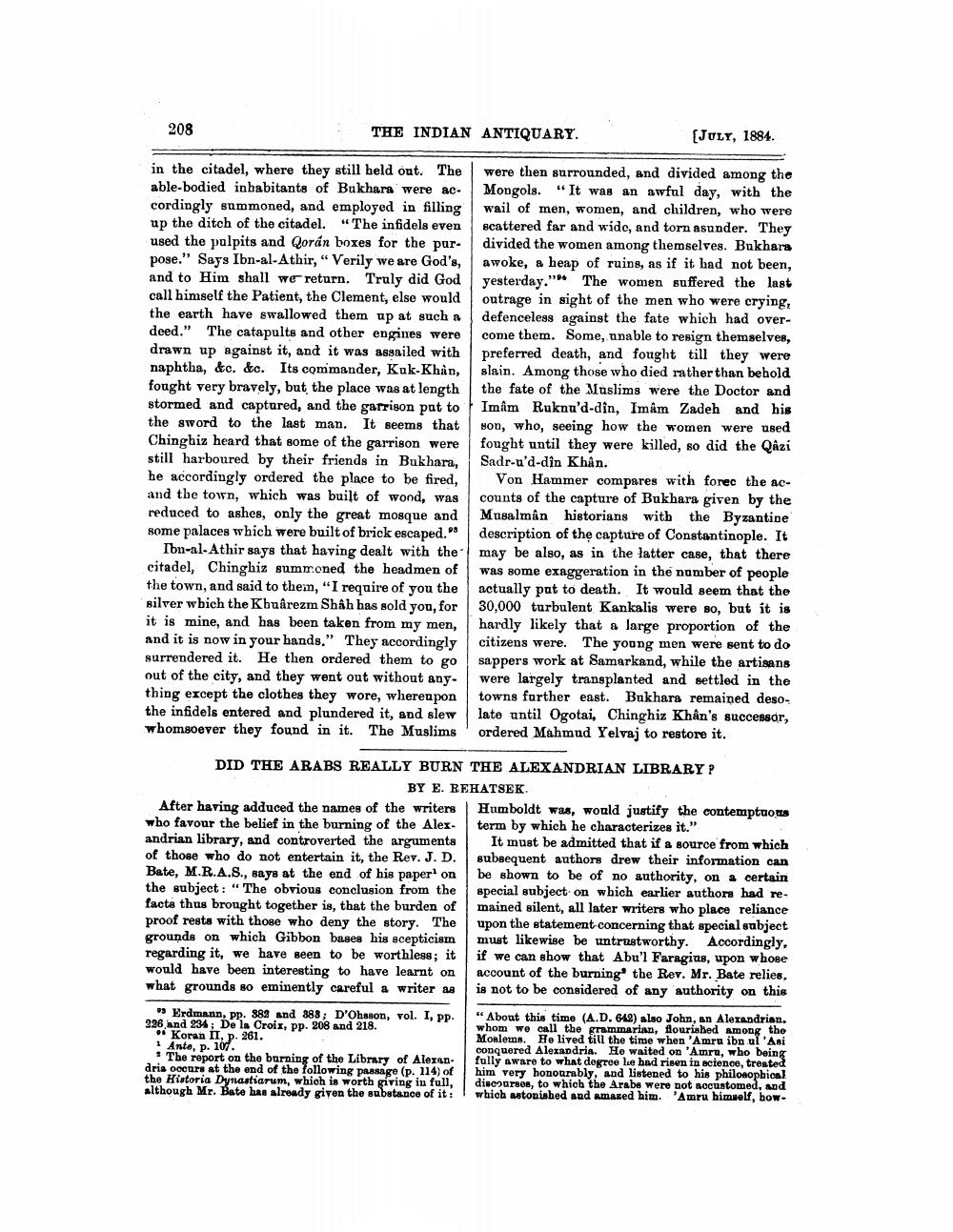________________
208
THE INDIAN ANTIQUARY.
in the citadel, where they still held out. The able-bodied inhabitants of Bukhara were accordingly summoned, and employed in filling up the ditch of the citadel. "The infidels even used the pulpits and Qorán boxes for the purpose." Says Ibn-al-Athir, " Verily we are God's, and to Him shall we return. Truly did God call himself the Patient, the Clement, else would the earth have swallowed them up at such a deed." The catapults and other engines were drawn up against it, and it was assailed with naphtha, &c. &c. Its commander, Kuk-Khan, fought very bravely, but the place was at length stormed and captured, and the garrison put to the sword to the last man. It seems that Chinghiz heard that some of the garrison were still harboured by their friends in Bukhara, he accordingly ordered the place to be fired, and the town, which was built of wood, was reduced to ashes, only the great mosque and some palaces which were built of brick escaped."
Ibn-al-Athir says that having dealt with the citadel, Chinghiz summoned the headmen of the town, and said to them, "I require of you the silver which the Khuârezm Shâh has sold you, for it is mine, and has been taken from my men, and it is now in your hands." They accordingly surrendered it. He then ordered them to go out of the city, and they went out without anything except the clothes they wore, whereupon the infidels entered and plundered it, and slew whomsoever they found in it. The Muslims
Erdmann, pp. 382 and 388; D'Ohsson, vol. I, pp. 226 and 234; De la Croix, pp. 208 and 218.
Koran II, p. 261.
[JULY, 1884.
were then surrounded, and divided among the Mongols. "It was an awful day, with the wail of men, women, and children, who were scattered far and wide, and torn asunder. They divided the women among themselves. Bukhara awoke, a heap of ruins, as if it had not been, yesterday." The women suffered the last outrage in sight of the men who were crying, defenceless against the fate which had overcome them. Some, unable to resign themselves, preferred death, and fought till they were slain. Among those who died rather than behold the fate of the Muslims were the Doctor and Imâm Ruknu'd-din, Imâm Zadeh and his son, who, seeing how the women were used fought until they were killed, so did the Qâzi Sadr-u'd-din Khân.
DID THE ARABS REALLY BURN THE ALEXANDRIAN LIBRARY? BY E. REHATSEK. After having adduced the names of the writers who favour the belief in the burning of the Alexandrian library, and controverted the arguments of those who do not entertain it, the Rev. J. D. Bate, M.R.A.S., says at the end of his paper1 on the subject: "The obvious conclusion from the facts thus brought together is, that the burden of proof rests with those who deny the story. The grounds on which Gibbon bases his scepticism regarding it, we have seen to be worthless; it would have been interesting to have learnt on what grounds so eminently careful a writer as
1 Ante, p. 107.
The report on the burning of the Library of Alexandria occurs at the end of the following passage (p. 114) of the Historia Dynastiarum, which is worth giving in full, although Mr. Bate has already given the substance of it:
Von Hammer compares with forec the accounts of the capture of Bukhara given by the Musalmân historians with the Byzantine description of the capture of Constantinople. It may be also, as in the latter case, that there was some exaggeration in the number of people actually put to death. It would seem that the 30,000 turbulent Kankalis were so, but it is hardly likely that a large proportion of the citizens were. The young men were sent to do sappers work at Samarkand, while the artisans were largely transplanted and settled in the towns further east. Bukhara remained desolate until Ogotai, Chinghiz Khân's successor, ordered Mahmud Yelvaj to restore it.
Humboldt was, would justify the contemptuous term by which he characterizes it."
It must be admitted that if a source from which subsequent authors drew their information can be shown to be of no authority, on a certain special subject on which earlier authors had remained silent, all later writers who place reliance upon the statement concerning that special subject must likewise be untrustworthy. Accordingly, if we can show that Abu'l Faragius, upon whose account of the burning the Rev. Mr. Bate relies, is not to be considered of any authority on this
"About this time (A.D. 642) also John, an Alexandrian. whom we call the grammarian, flourished among the Moslems. He lived till the time when 'Amru ibn ul 'Asi conquered Alexandria. He waited on 'Amra, who being fully aware to what degree he had risen in science, treated him very honourably, and listened to his philosophical discourses, to which the Arabe were not accustomed, and which astonished and amazed him. 'Amru himself, how




